Living with and beyond cancer: The improvement story so far - NHS ...
Living with and beyond cancer: The improvement story so far - NHS ...
Living with and beyond cancer: The improvement story so far - NHS ...
Create successful ePaper yourself
Turn your PDF publications into a flip-book with our unique Google optimized e-Paper software.
26 | <strong>Living</strong> <strong>with</strong> <strong>and</strong> <strong>beyond</strong> <strong>cancer</strong>: <strong>The</strong> <strong>improvement</strong> <strong>story</strong> <strong>so</strong> <strong>far</strong><br />
Guy’s <strong>and</strong> St Thomas’ <strong>NHS</strong> Foundation Trust<br />
Surviving <strong>cancer</strong> living life – a nurse led telephone<br />
service for breast <strong>and</strong> prostate <strong>cancer</strong> survivors<br />
Pfizer Health Solutions<br />
Guy’s <strong>and</strong> St Thomas’<br />
<strong>NHS</strong> Foundation Trust<br />
<strong>NHS</strong><br />
Summary<br />
Surviving Cancer <strong>Living</strong> Life (SCLL) is a<br />
telephone based support service<br />
launched by Guy’s <strong>and</strong> St Thomas’ <strong>NHS</strong><br />
Foundation Trust (GSTT) in May 2008.<br />
This pilot service is offered to people<br />
who have recently finished active<br />
treatment (surgery, radiotherapy,<br />
chemotherapy) for breast or prostate<br />
<strong>cancer</strong>, that received any part of their<br />
treatment at these hospitals.<br />
SCLL is run by the Trust in partnership<br />
<strong>with</strong> Pfizer Health Solutions (PHS),<br />
financially supported by Guy’s <strong>and</strong> St<br />
Thomas’ Charity. By May 2010 over<br />
570 breast <strong>and</strong> prostate <strong>cancer</strong> patients<br />
have used the service <strong>and</strong> it has been<br />
extremely well received.<br />
Two experienced <strong>cancer</strong> nurses referred<br />
to as care managers give per<strong>so</strong>nalised<br />
telephone-based support. This holistic<br />
service uses the concepts of<br />
motivational interviewing <strong>and</strong> health<br />
coaching to help people to:<br />
• Better underst<strong>and</strong> factors that affect<br />
their health<br />
• Build confidence <strong>and</strong> skills to cope<br />
<strong>with</strong>, <strong>and</strong> overcome, the anxiety of<br />
living life after <strong>cancer</strong><br />
• Acquire the skills, knowledge <strong>and</strong><br />
habits in order to remain fit <strong>and</strong><br />
healthy<br />
• Follow their treatment programmes<br />
correctly<br />
• Underst<strong>and</strong> how to engage <strong>with</strong>, <strong>and</strong><br />
use, local <strong>NHS</strong>, <strong>so</strong>cial <strong>and</strong> voluntary<br />
services more effectively.<br />
Following an initial assessment, the<br />
patient <strong>and</strong> the care manager identify<br />
priorities <strong>and</strong> <strong>and</strong> develop an individual<br />
care plan, focusing on the areas of<br />
greatest need. Telephone calls are<br />
planned, usually starting fortnightly,<br />
before moving to monthly. Patients<br />
usually access the service for between<br />
six <strong>and</strong> nine months.<br />
<strong>The</strong> problem<br />
• <strong>The</strong> steering group, formed in the<br />
autumn of 2007, consisted of staff<br />
from GSTT, PHS <strong>and</strong> King’s College<br />
London (KCL), identified a lack of<br />
support for <strong>cancer</strong> survivors<br />
• PHS had already developed a<br />
telephone-based support service for<br />
people <strong>with</strong> chronic conditions such<br />
as COPD <strong>and</strong> were interested in<br />
developing the model to include<br />
<strong>cancer</strong> patients<br />
• It was decided to pilot this telephonebased<br />
support service <strong>with</strong> breast <strong>and</strong><br />
prostate <strong>cancer</strong> patients as they are a<br />
large patient group of both sexes.<br />
What was done<br />
Project Scoping<br />
In October 2007 the two main parties<br />
GSTT <strong>and</strong> PHS agreed to pilot a<br />
telephone service, <strong>with</strong> Kings College<br />
London to evaluate the service.<br />
Contracts were signed off.<br />
Development phase<br />
December 2007 – May 2008<br />
• Steering group set up <strong>with</strong><br />
representatives from all organisations<br />
<strong>and</strong> the project plan signed off<br />
• Evaluation meetings, project working<br />
group meetings <strong>and</strong> meetings <strong>with</strong><br />
various stakeholders al<strong>so</strong> took place<br />
regularly during the development<br />
phase<br />
• Barriers <strong>and</strong> challenges at this point<br />
included recruiting the care managers<br />
(b<strong>and</strong> 7 oncology nurses) <strong>and</strong><br />
integrating the Trust IT system <strong>and</strong> a<br />
new PHS <strong>so</strong>ftware system to record<br />
patient’s details <strong>and</strong> care plans<br />
• <strong>The</strong> care managers five week<br />
training programme included<br />
motivational interviewing, advanced<br />
communications, detailed sessions on<br />
the role of the care manager <strong>and</strong> IT<br />
system training



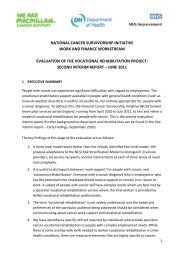
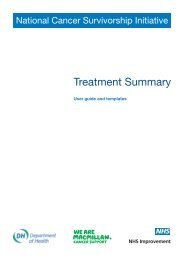
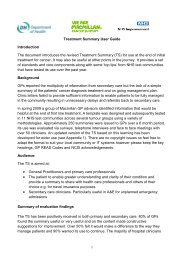
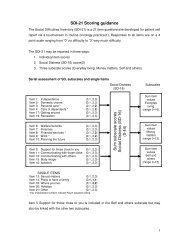

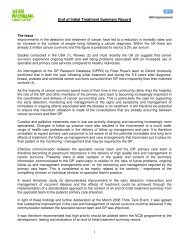
![Download the how to guide [PDF] - Macmillan Cancer Support](https://img.yumpu.com/47067428/1/184x260/download-the-how-to-guide-pdf-macmillan-cancer-support.jpg?quality=85)
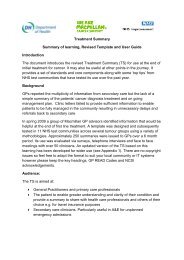

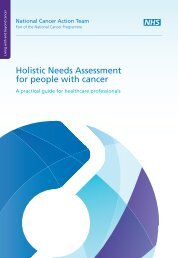
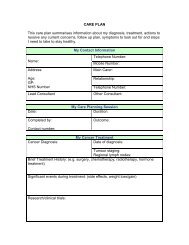

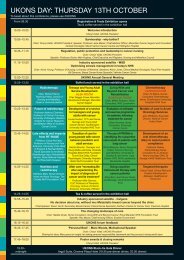
![HOPE Protocol [PDF, 420KB] - National Cancer Survivorship Initiative](https://img.yumpu.com/32566432/1/184x260/hope-protocol-pdf-420kb-national-cancer-survivorship-initiative.jpg?quality=85)